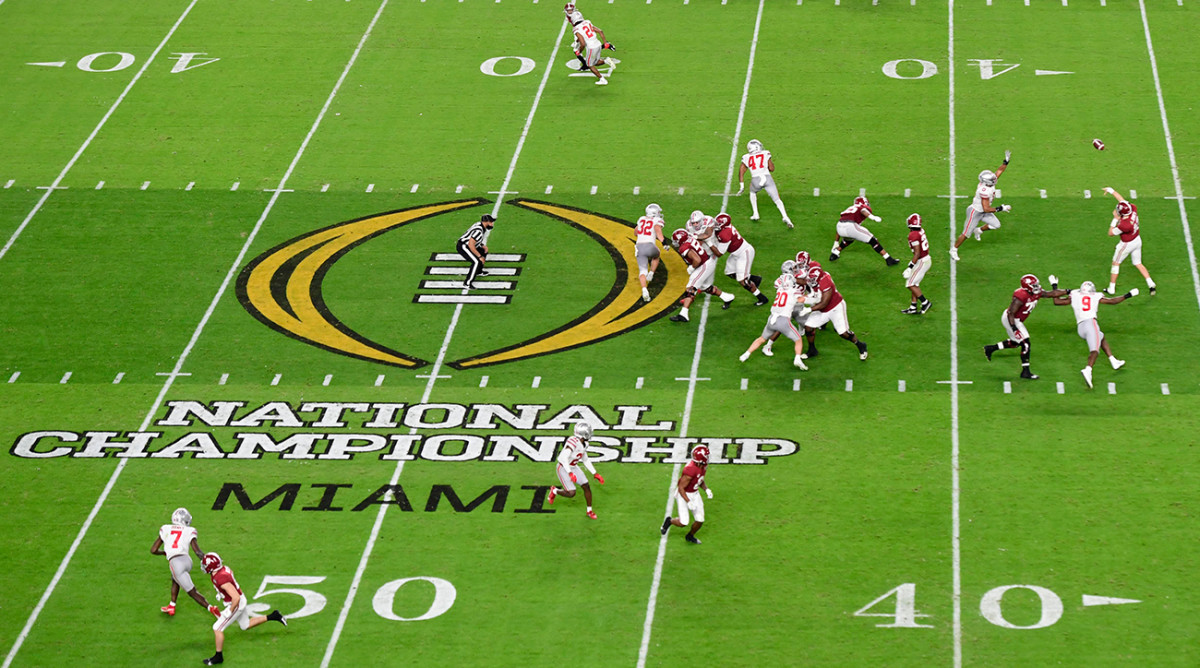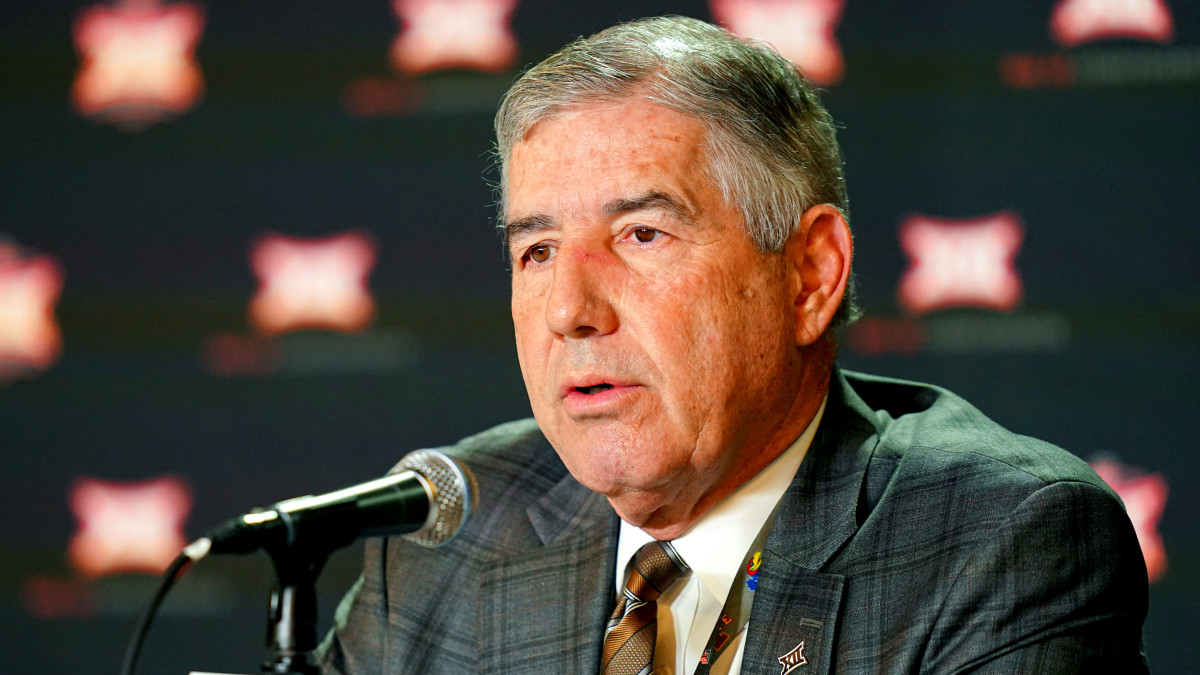The Ties That Divide: Expanding the College Football Playoff Has Become Increasingly Difficult
LAS VEGAS — Jim Phillips extended his fist toward Greg Sankey.
A punch? Of course not, silly! A fist bump.
Balling his right hand, the SEC commissioner engaged his ACC colleague in what has become the world’s post-COVID-19 gentleman’s exchange.
“I warmed them up for you,” Phillips told Sankey. “Now it’s time for the main event.”
Phillips had just completed his question-and-answer segment here at the annual Intercollegiate Athletics Forum at the glitzy Aria Casino on the Vegas Strip, and up next was Sankey.
Deep within this colossal structure’s belly, well past the Christmas-themed lobby and the cigar lounge, beyond the dizzying array of slot machines and table games, up three flights of escalators and around a bend of conference meeting rooms, the most powerful people in college football, finally, put their collective cards on the table.
In a car-wash-style event in front of hundreds of college administrators, each Power 5 commissioner took a public stance on a raging topic in college sports: expanding the College Football Playoff.

Phillips and the ACC prefer an eight-team model and believe expanding now, before the NCAA transformation situation is resolved, could be a mistake. Kevin Warren and the Big Ten are only in support of a model that guarantees automatic berths to the Power 5 conference champions, and the ACC agrees. The Pac-12 is on the fence, said commissioner George Kliavkoff, open to potentially supporting either a 12- or eight-team model, with or without automatic qualifiers.
And then there’s everybody else—the majority eight, who have publicly and privately thrown their support behind the original 12-team proposal revealed over the summer. That proposal grants automatic berths to the six highest-ranked conference champions and completes the field with six at-large selections.
As commissioners slowly flipped their cards over here this week, the divide is becoming evident. Two camps are forming, and one thing is abundantly clear: They are not reaching unanimous consent. Expanding by 2024 or ’25 is in serious jeopardy. They are at such a stalemate that conversations at their most recent meeting last week nearly ended in a white-flag-waving decision to halt expansion talks altogether.
What happens to the poker game if the hands are all shown? It’s time for a new deal.
The group is set to meet again at the championship site in Indianapolis next month. Several commissioners suggested to Sports Illustrated that they should recommend the expansion model that garners the most votes, advancing the format to the executive level for final approval. A recommendation from the commissioners does not have to be unanimous.
However, to expand the Playoff before the current contract ends (it runs through 2025), unanimous consent is needed from the executives—the group of 10 FBS presidents and the Notre Dame president. If the commissioners would recommend a model without unanimity, would their corresponding president really vote against their own commissioner’s recommendation?
Either way, this maddening and divisive situation appears to be creeping toward a breaking point.
The newest Power 5 commissioner has another alternative to the riddle, one he has privately held for weeks and is now making public. An outsider to college sports administration, Kliavkoff enters with a unique approach. The former MGM Resorts executive believes commissioners should focus more on the long-term situation. There is no Playoff structure or contract after the current deal expires.
While unanimity is required to expand the Playoff before the contract ends, unanimity is not necessary to create a Playoff format in a new contract that would begin in 2026.
So what is Kliavkoff’s plan? A “subset” of the CFP Management Committee—the 10 FBS commissioners and Notre Dame’s Jack Swarbrick—would agree on a model and “then others would have the right to join us,” he said.
Is he suggesting the Power 5 create the format?
“You guys can all determine for yourself what subset of those 11 people would have to say, ‘We agree,’ for that to become the College Football Playoff,” Kliavkoff said. “Once you do that and by definition, because it’s going to be expanded, it provides more access for everyone, I think you could then go back to the people who weren’t part of the group that came up with the new proposal and say, ‘We’d also like to start that in ’24, not in ’26.’ Everybody would go, ‘We’re O.K. with that.’”
But among Power 5 commissioners, a divide exists. Sankey has expressed disinterest in an eight-team plan with automatic qualifiers because it does not provide enough at-large spots.
Swarbrick is in a similar camp, and maybe Big 12 boss Bob Bowlsby as well. Can a Playoff be formed without two of the most important brands in football: Notre Dame and the SEC?
The gap between the SEC and other leagues continues to widen. The additions of Oklahoma and Texas further separate the richest and most powerful league from its neighbors. During his Q-and-A segment Wednesday, Sankey was asked why the SEC can’t operate its own championships.
“Well, we could,” he said. “There is a thing in life [that said], ‘Just because you can, doesn't mean you should.’”
This week’s event provided the most public platform yet for the leaders of college football’s most powerful entities to express their frustrations. Division within their ranks have reached levels not seen before, administrators say. Most attribute the friction to a pair of issues: the discord in handling COVID-19 a year ago coupled with this year’s conference realignment wave.
All of this is unfolding under the giant umbrella of change in college athletics, as leaders are in the early stages of potential radical alterations to NCAA Division I—all of it connected to the ongoing battle over Playoff expansion.
“Is this the right time [to expand] with everything else going on with the NCAA?” Phillips asked during his segment.
“It’s so easy to make [short-term] decisions,” Warren said. “I sit here and say, 10, 12, 15 years from now, someone comes in and said we’re really glad they did that.”
In small media groupings and onstage as well, members of one camp jabbed the others. One of them, Kliavkoff, criticized others for talking too deeply about the issues to the press.

Bowlsby and Sankey continued their subtle digs at The Alliance, a three-league group of the Pac-12, ACC and Big Ten that formed after the latest realignment wave began. When asked if he’s miffed the Big 12 wasn’t invited to join the trio, Bowlsby shrugged. “I think they’ve got some work to do to demonstrate The Alliance is a force to be reckoned with,” he said.
The Alliance is seen by many as standing in the way of expansion. At least two of its three members have now publicly stated they are against the 12-team model that at least eight others support. The group also includes the three newest conference commissioners, something others have pointed to as a factor in the expansion process.
“We’ve got some new guys who don’t have a whole lot of sense of history. I don’t begrudge them that,” Bowlsby said. “It’s a lot to get up to speed on.”
On Wednesday, Bowlsby and Sankey pushed back on the ACC and Big Ten’s issues. A Playoff that guarantees automatic bids to Power 5 champions could pose legal issues, would further fracture the FBS and is not for the good of college sports, Bowlsby said. Sankey disagrees with Phillips’s suggestion that the process must be delayed until the NCAA transformation process—of which Sankey is leading—is complete.
“We created the CFP in the midst of autonomy being created,” Sankey said. “We have a track record of being able to make a decision amid change.”
Sankey shrugs at the thought of delayed expansion. For a second time in five years, the SEC has qualified two teams for the CFP. Three Power 5 conferences were left out of the CFP this year. The Pac-12 has missed the Playoff for the fifth straight year. With their powerhouse Clemson struggling, the ACC missed the event for the first time in its eight-year existence. The Big 12 did not qualify a team for a second straight season.
Supporters say these are stirring reminders expansion is needed and it would come with a significant financial windfall. A 12-team expansion in the final two years of the contract would generate an additional $450 million in revenue—some of which would be used for long-term athlete health care and family travel.
Watch NCAA football games online all season long with fuboTV: Start with a 7-day free trial!
More important, though, a 12-team expansion would provide 16 extra postseason opportunities over those two years. And that, said MAC commissioner Jon Steinbrecher, is why the current four-team Playoff was created.
“I don’t know if it’s tensions, but collectively as a group, we need to go back and think about what got us to the four-team Playoff,” Steinbrecher said. “The original 12-team model on the table is a thoughtful model. It does a host of things that I don’t know everyone thought could be achieved. It is a clever way to manage it.”
And so what now? Do commissioners really recommend a model without unanimity? Do they delay any expansion until at least 2026 when a new contract can begin?
In an appropriate comment here on the Vegas Strip, one commissioner chuckles during an interview when discussing the end game.
“All bets,” he said, “are off.”
More College Football Coverage:
• Bowl Watchability Rankings: One Reason to Tune In to Every Matchup
• You May Not Believe in Cade McNamara. But He Does. And That’s Enough.
• A History-Making Playoff Selection Day Still Has a Familiar Face at the Top
• Orange Bowl Preview: Michigan-Georgia to Put Defense in the Spotlight
• Cotton Bowl Preview: Cincinnati Looks to Prove It Belongs Against SEC Powerhouse Alabama
Sports Illustrated may receive compensation for some links to products and services on this website.
